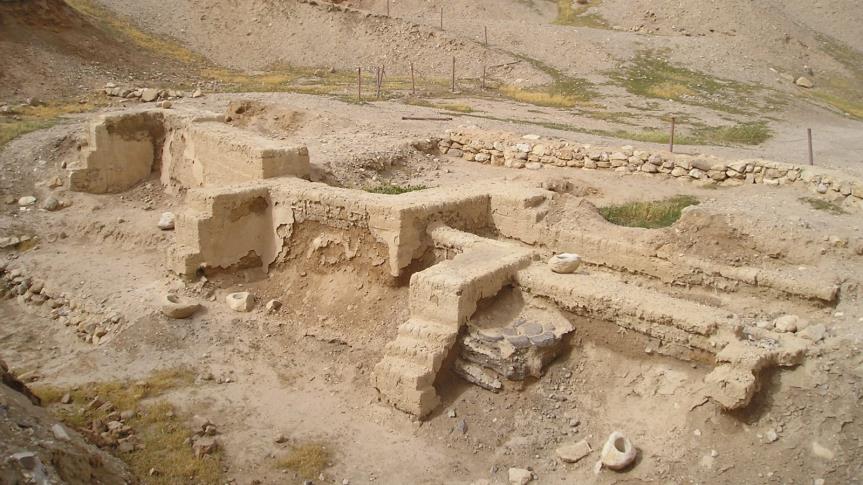التَّرْكِيبُ الْوَصْفِيُّ
* يُسْتَخْدَمُ الْوَصْفُ لِتَحْدِيدِ الِاسْمِ أَوْ تَقْلِيلِ عُمُومِهِ بِذِكْرِ صِفَةٍ مِنْ صِفَاتِهِ.
* يَتَأَلَّفُ التَّرْكِيبُ الْوَصْفِيُّ مِنْ صِفَةٍ (نَعْتٍ) وَ مَوْصوفٍ (مَنْعوتٍ).
مِثالٌ: أَرِيحَا الْقَدِيمَةُ . (أَرِيحَا: مَوْصوفٌ، الْقَدِيمَةُ: صِفَةٌ).
* تُطابِقُ الصِّفَةُ الْمَوْصُوفَ فِي:
- التَّعْريفِ والتَّنْكِير: عُنْصُرٌ رَئِيسِيٌّ / الْعُنْصُرُ الرَّئِيسِيُّ
- النَّوْعِ (التَّذْكِير والتَّأْنِيث): مَوْقِعٌ قَدِيمٌ/ مَدِينَةٌ قَدِيمَةٌ.
- العَدَدِ (الإفْراد والتَّثْنِيَة والجَمْع): عَالِمُ آثَارٍ إيطَالِيٌّ / عُلَمَاءُ آثَارٍ إيطَالِيُّونَ.
- الإعْرابِ (الرَّفْع والنَّصْب والجَرّ): وَجَدَ عُلَمَاءُ آثَارٍ إيطَالِيُّـونَ قِطَعًا أَثَرِيَّـةً مِصْرِيَّـةً فِي مَدِينَةِ أَرِيحَا الْقَدِيمَـةِ.
تَنْبِيهٌ:
يُوصَفُ جَمْعُ غَيْرِ العاقِلِ غَالِبًا بِمُفْرَدٍ مُؤَنَّثٍ: هُناكَ رَوَابِطُ قَدِيمَـةٌ بَيْنَ مِصْرَ وَفِلَسْطِينَ.
The attributive adjective, الصِّفَةُ
الصِّفَةُ is an attributive adjective that comes after a noun الْمَوْصُوف to describe it by specifying some of its attributes.
The attributive adjective agrees with the noun it describes in the following:
- Declension: it is declined in the same way as the noun it qualifies (nominative, accusative or genitive): Ex. : وَجَدَ عُلَمَاءُ آثَارٍ إيطَالِيُّـونَ قِطَعًا أَثَرِيَّـةً مِصْرِيَّـةً فِي مَدِينَةِ أَرِيحَا الْقَدِيمَـةِ (Italian archeologists found ancient Egyptian artifacts in the ancient city of Jericho)
- Definiteness and indefiniteness: it is in the definite form if the noun it describes is in the definite form, it is in the definite form as well. Ex. عُنْصُرٌ رَئِيسِيٌّ / الْعُنْصُرُ الرَّئِيسِيُّ (main element / the main element).
- Gender: it is most of the time in the masculine form if the noun it describes is masculine and in the feminine form if the noun it describes is feminine. Ex. مَوْقِعٌ قَدِيمٌ/ مَدِينَةٌ قَدِيمَةٌ (old site / old town)
- Number: the attributive adjective, agrees –most of the time- with the noun it describes in the singularity, duality and plurality. Ex. عَالِمُ آثَارٍ إيطَالِيٌّ / عُلَمَاءُ آثَارٍ إيطَالِيُّونَ (Italian archaeologist / archaeologists).
Note: if the qualified noun is a non-human plural, جَمْعٌ لِغَيْرِ الْعَاقِلِ, the adjective remains in the singular feminine form. Ex.: رَوَابِطُ قَدِيمَـةٌ (old links)
